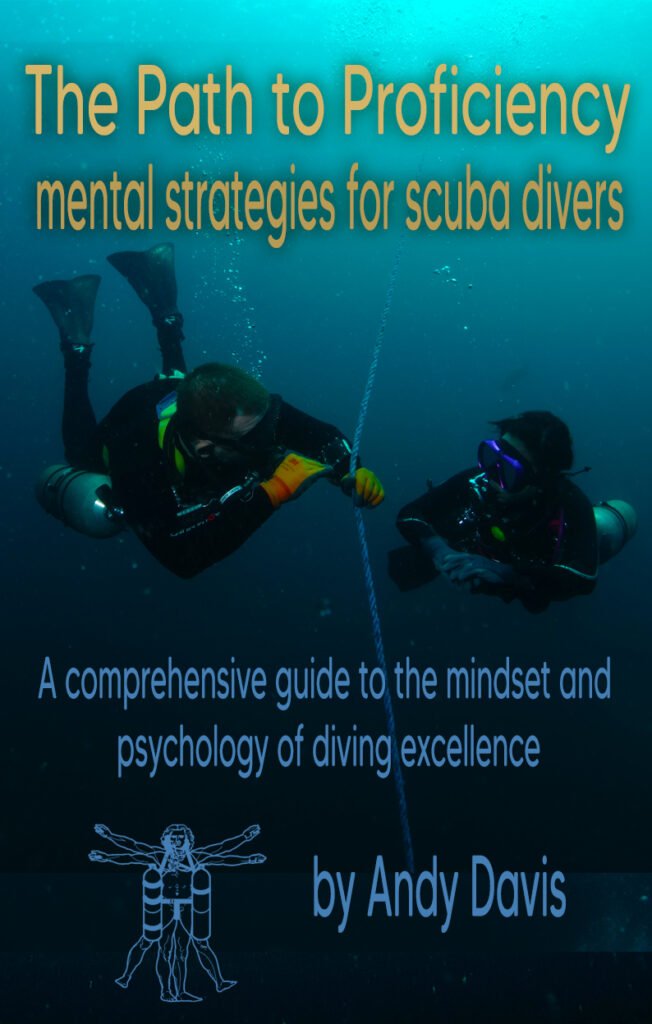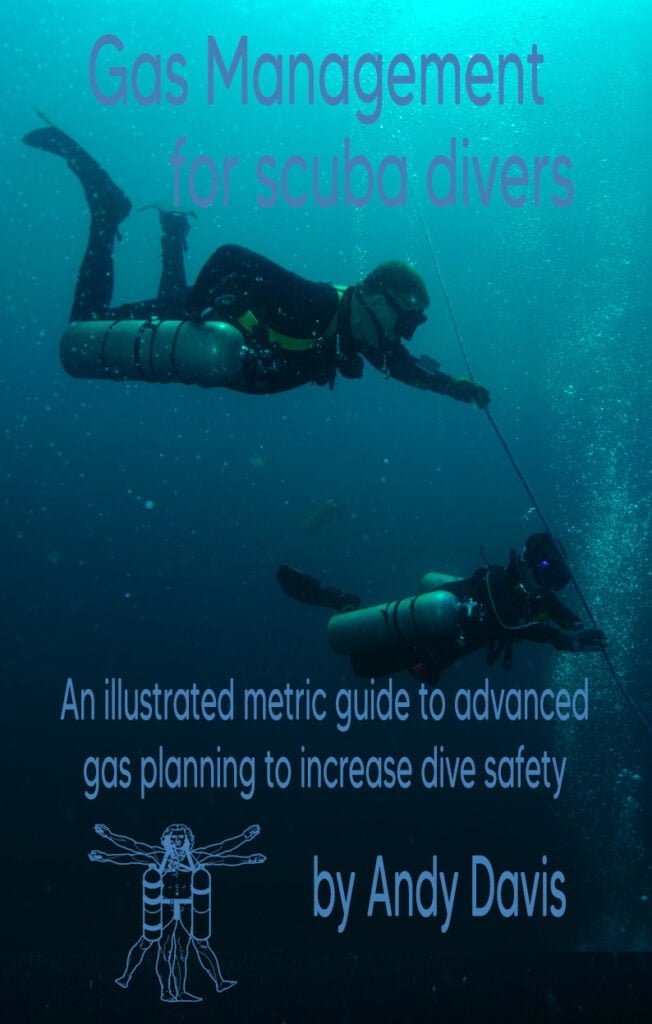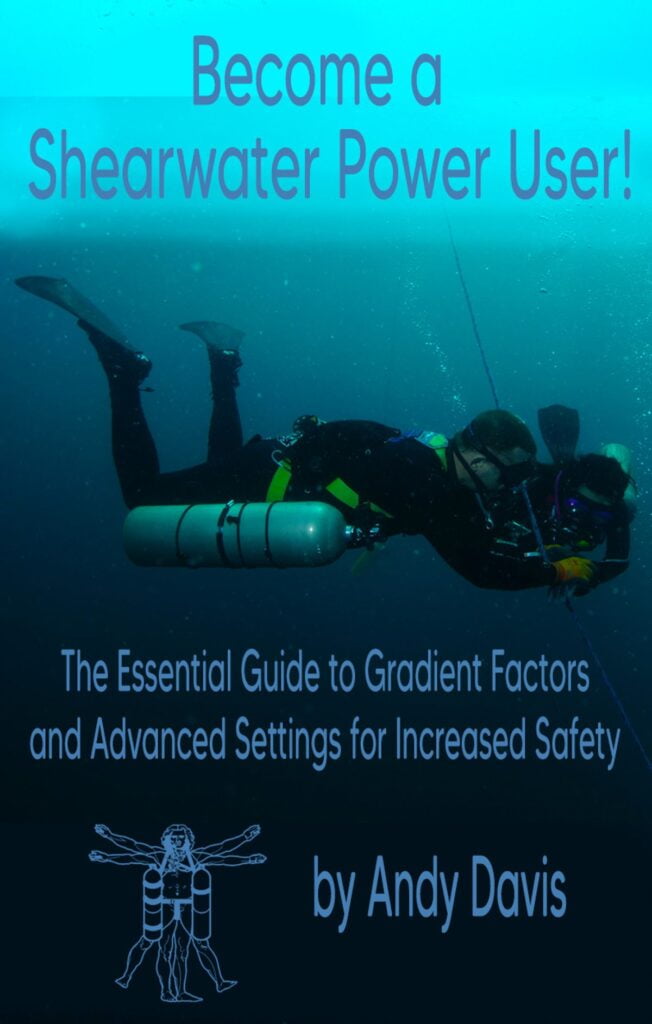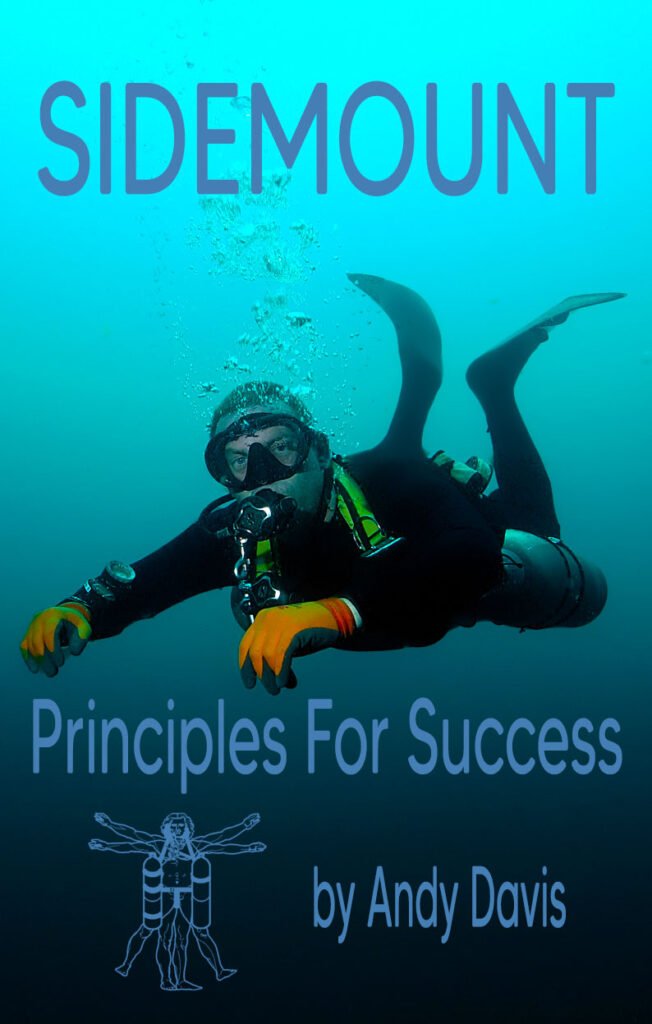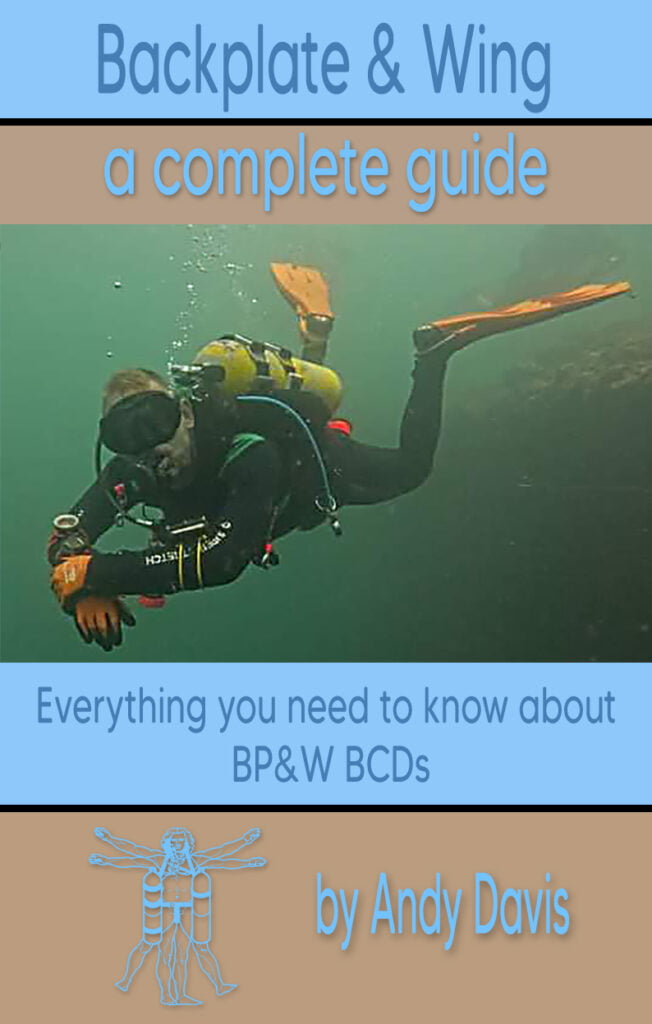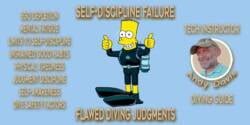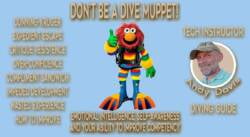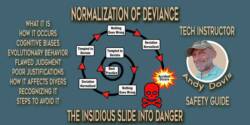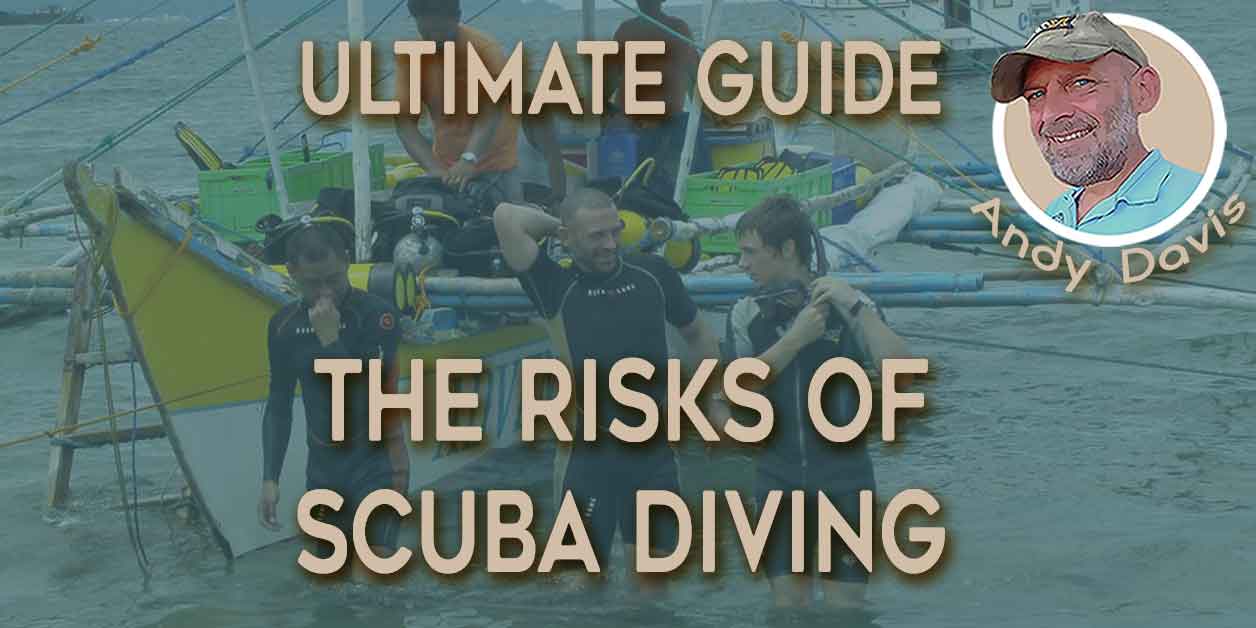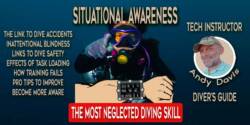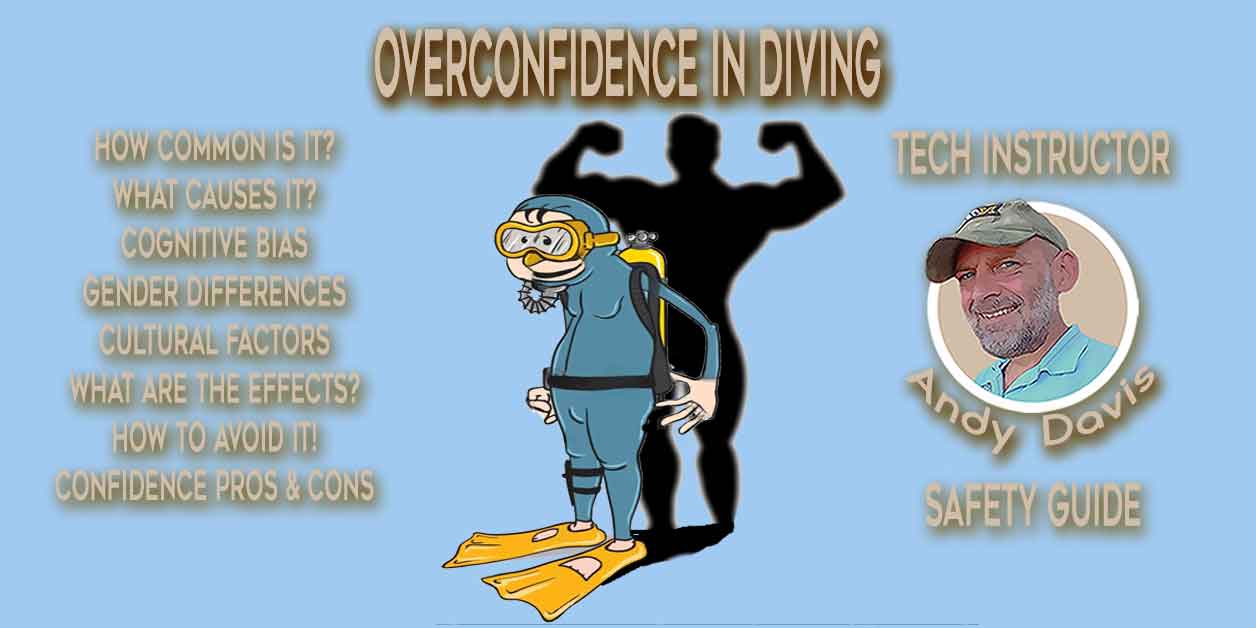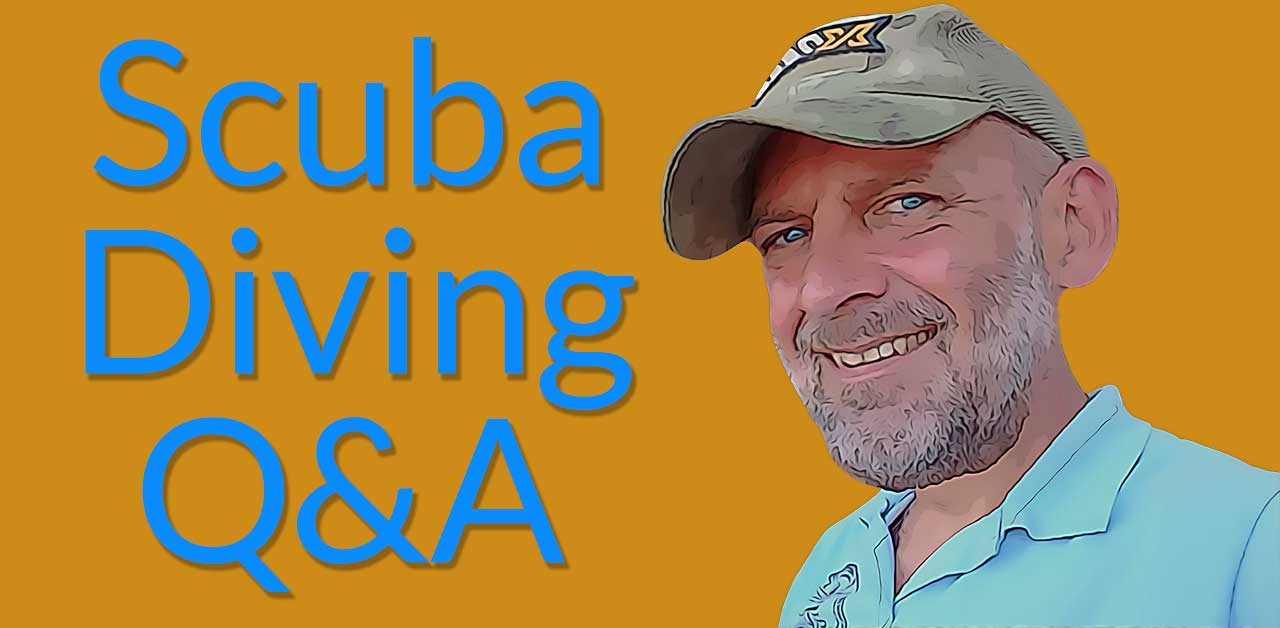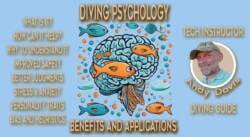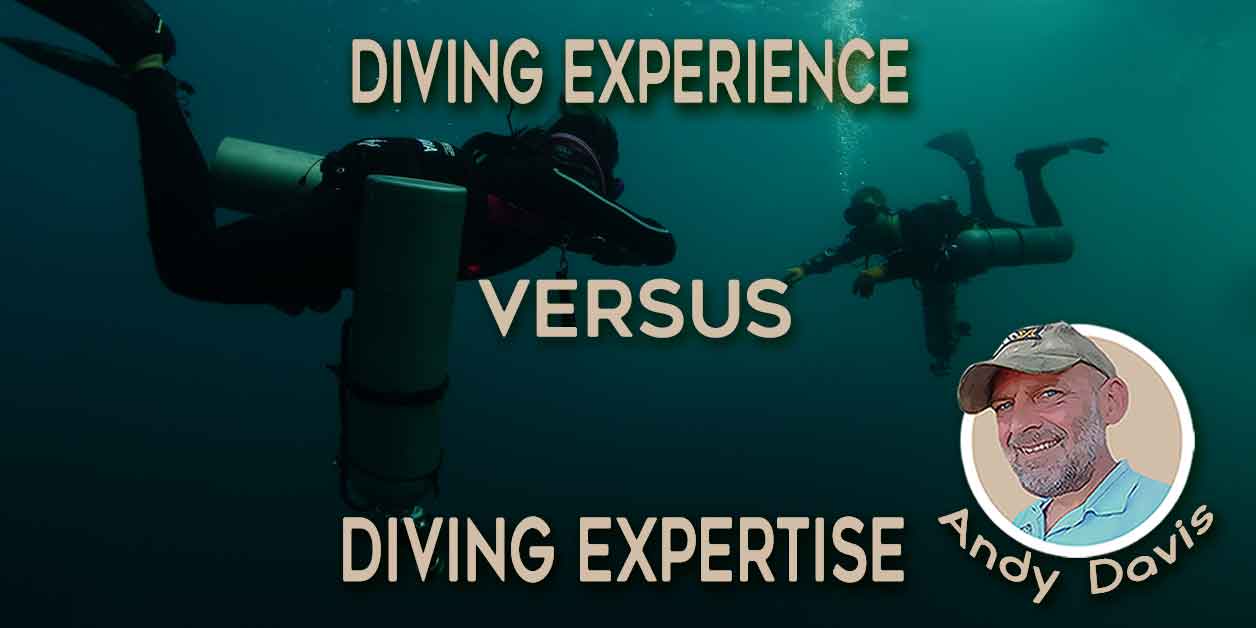The Dunning-Kruger Effect and Risk Judgment in Scuba Diving
The Dunning-Kruger effect is a fascinating cognitive bias that holds significant implications not just in the realm of psychology but also in various domains, including scuba diving.
This phenomenon, named after psychologists David Dunning and Justin Kruger, sheds light on how individuals with low competence in a particular area tend to overestimate their abilities.
In other words, it’s a psychological tendency where those who know the least often think they know the most.
In this article, I will explore the Dunning-Kruger effect, its implications in the world of scuba diving, and how self-awareness plays a pivotal role in mitigating its impact.
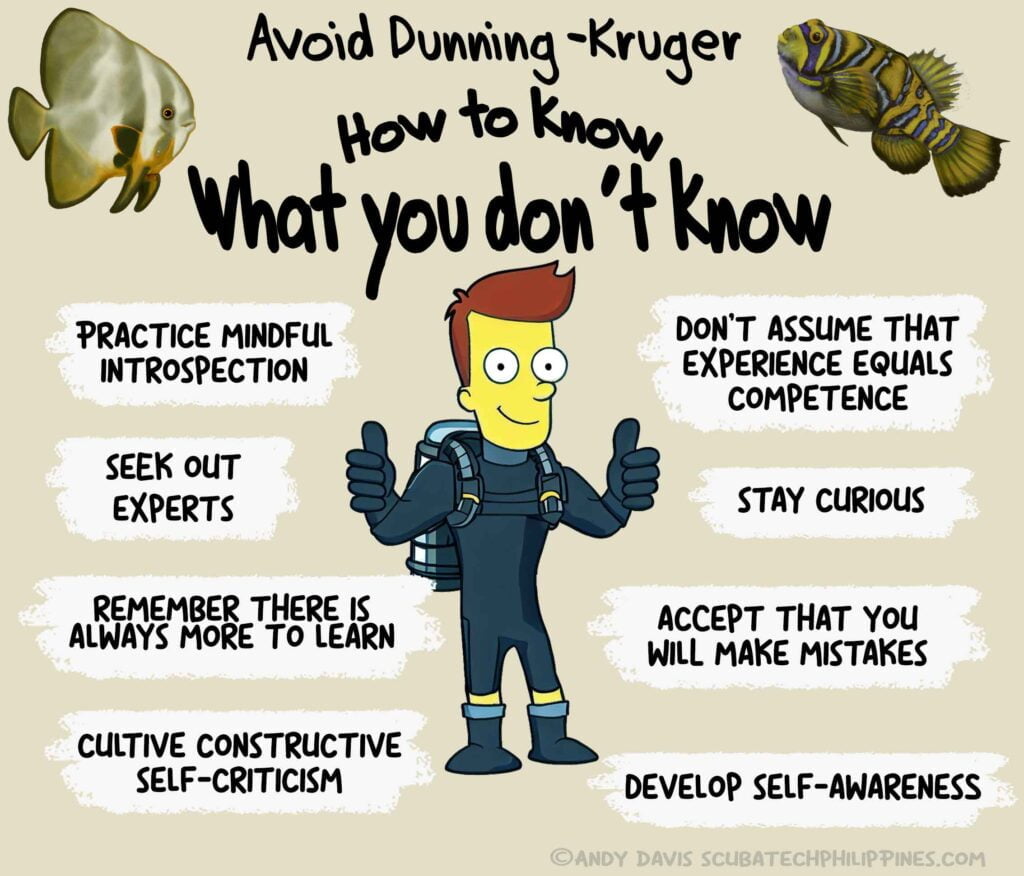
What is the Dunning-Kruger Effect?
The Dunning-Kruger effect is a cognitive bias in which individuals who are unskilled in certain domains overestimate their ability and are unaware of it. At its core, the Dunning-Kruger effect can be summarized in three key points:
Incompetence
Individuals with low competence in a specific skill or domain often lack the expertise needed to accurately assess their abilities. They may operate in blissful ignorance of their limitations.
Overconfidence
Due to their limited knowledge or skills, those affected by the Dunning-Kruger effect tend to harbor an inflated sense of confidence. They genuinely believe they are far better at something than they truly are.
Accurate Self-Assessment
Conversely, individuals with higher competence in a given area are more likely to accurately assess their abilities and may even underestimate themselves. This humbling effect stems from their awareness of the complexities and nuances involved in the domain.
The Dunning-Kruger effect extends its reach across a spectrum of fields, encompassing everything from cognitive tasks to social and interpersonal skills. It’s a stark reminder that self-awareness and continuous learning are crucial to improving one’s abilities.
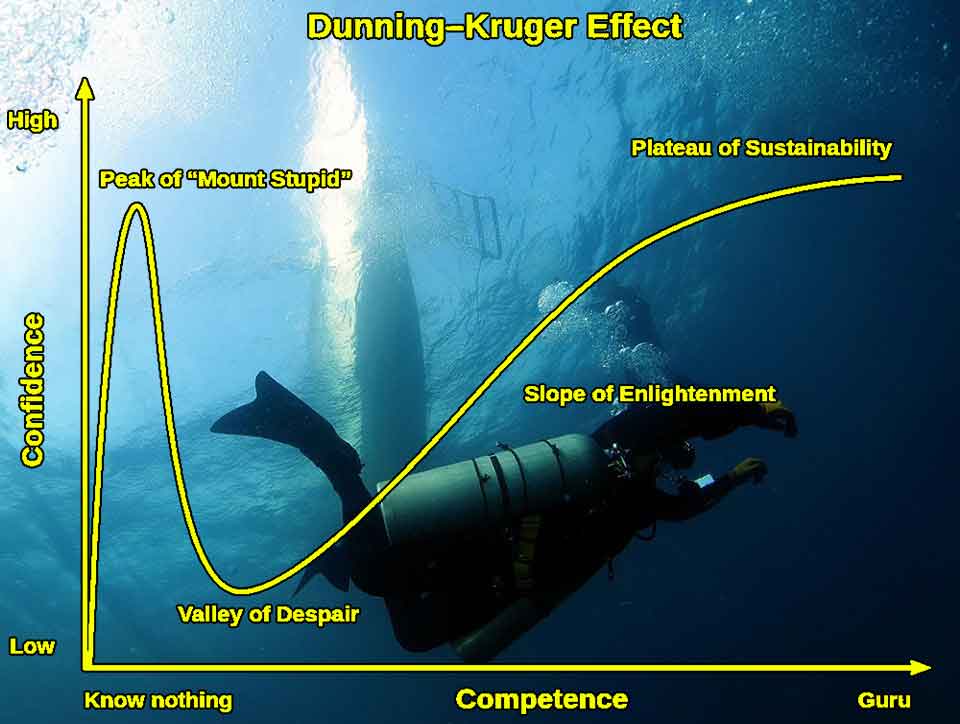
Self-Awareness and the Dunning-Kruger Effect
Self-awareness stands as a powerful antidote to the Dunning-Kruger effect, especially in the context of scuba diving. Here’s how self-awareness can either exacerbate or mitigate this cognitive bias:
Lack of Self-awareness Amplifies the Effect
- The Dunning-Kruger effect tends to be more pronounced in individuals who lack self-awareness.
- When people are unaware of their limitations or weaknesses, they are more likely to overestimate their abilities.
- In essence, they lack the metacognitive awareness to assess their skills accurately.
Increasing Self-awareness Can Mitigate the Effect
- As individuals become more self-aware, they develop a keener sense of their limitations and areas where they lack expertise.
- This growing self-awareness prompts them to question their judgments and seek feedback or additional information.
- Consequently, it helps reduce the overconfidence associated with the Dunning-Kruger effect.
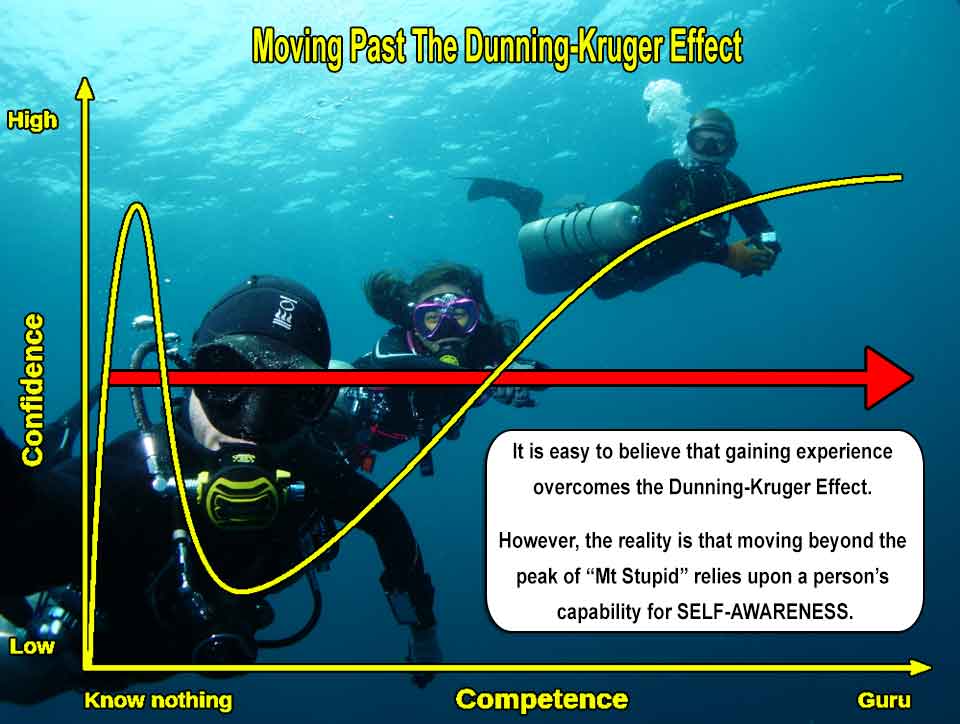
Feedback and Experience Matter
- Self-awareness can be honed through feedback and experience.
- Constructive criticism and feedback from other divers often lead individuals to reevaluate their self-perceptions.
- Furthermore, as divers accumulate experience in a particular domain, they naturally become more aware of their limitations and the intricacies involved, thus mitigating the Dunning-Kruger effect.
Cultivating Self-awareness
Techniques like mindfulness, introspection, and self-reflection can be invaluable in cultivating self-awareness. These practices encourage divers to critically examine their thoughts, actions, and abilities, making them less susceptible to the Dunning-Kruger effect.
In essence, self-awareness can either magnify or temper the Dunning-Kruger effect. Those who actively work on improving their self-awareness are better equipped to accurately gauge their diving skills and knowledge.
Research History Behind the Dunning-Kruger Effect
The Dunning-Kruger effect didn’t emerge out of thin air and is definitely not “pop psychology” or “pseudo-science“. Let’s delve into a summarized history of the research that underpins this psychological phenomenon:
Origins and Initial Research (1999)
The Dunning-Kruger effect made its debut when social psychologists David Dunning and Justin Kruger published their seminal paper, “Unskilled and Unaware of It: How Difficulties in Recognizing One’s Own Incompetence Lead to Inflated Self-Assessments.”
Their groundbreaking paper, published in the Journal of Personality and Social Psychology in 1999, thrust the concept into the spotlight. It swiftly gained recognition in both academic circles and popular culture due to its intuitive appeal and relevance to everyday situations.
Their research commenced with studies examining individuals’ self-assessments across various skills, such as humor, grammar, and logic.
Empirical Findings
- Dunning and Kruger’s studies revealed a consistent pattern.
- Those who scored poorly on skill-related tests tended to overestimate their abilities.
- Crucially, they lacked the metacognitive awareness needed to accurately gauge their competence.
- This overestimation was most pronounced among those with the lowest skill levels.
- Individuals with higher competence typically underestimate their abilities.
The Dunning-Kruger Effect and Diving Risk Management
In the context of diving risk management, this effect can have significant implications. Here are 5 risk factors that can be caused by the Dunning-Kruger Effect:
- Inaccurate Risk Assessments: Divers with limited competency may be overly confident in their ability to assess and mitigate risks. This can lead to a failure to identify and address critical risks, resulting in a higher risk of diving accidents.
- Lack of Preparedness: Divers affected by the Dunning-Kruger Effect may not invest enough attention in contingency planning. This lack of preparedness can leave the divers vulnerable to otherwise foreseeable and manageable risks.
- Ineffective Decision-Making: When divers overestimate their competency, they may make decisions and judgments that are not well-informed, potentially leading to hazardous mistakes.
- Failure to Learn: The bias can hinder skill development as divers may not seek further education, training, or improvement, assuming they are already sufficiently competent
- Misleading Advice: Divers with the Dunning-Kruger effect may give advice or information that is incorrect but presented with unwarranted confidence, potentially leading others astray.
- Resistance to Criticism: Divers affected by the Dunning-Kruger Effect are likely to react dismissively or defensively when presented with constructive criticism.
In summary, the Dunning-Kruger Effect can pose significant risks within diving risk management by causing individuals to overestimate their abilities and make poor judgments regarding risk assessment and mitigation. Recognizing this bias and taking steps to address it is crucial for safe diving.
Recognizing the Dunning-Kruger Effect: Do You Suffer From It?
Now that we’ve delved into the Dunning-Kruger effect, you might wonder how to recognize if you, or someone you know, are experiencing this cognitive bias. Here are some telltale signs to consider:
- Lack of Self-Awareness: People afflicted by the Dunning-Kruger effect often remain blissfully unaware of their incompetence. They genuinely believe they excel in a particular area, even when evidence suggests otherwise.
- Overconfidence: Those influenced by this bias tend to exhibit unwarranted confidence in their abilities, regardless of their limited knowledge or skills in a specific field.
- Incompetence Recognition Gap: Individuals grappling with the Dunning-Kruger effect may struggle to recognize the competence of others, especially experts. They might dismiss their advice or expertise.
- Difficulty in Self-Assessment: Accurately assessing their strengths and weaknesses becomes challenging for these individuals. Their skewed perception of their abilities often leads to poor judgment.
- Failure to Improve: People under the influence of this bias might not invest significant efforts in improving their skills because they genuinely believe they are already highly competent.
- Defensiveness: When confronted with evidence of their incompetence, they tend to react defensively, rejecting criticism or feedback.
It’s important to note that the Dunning-Kruger effect isn’t an all-or-nothing phenomenon. Many people may experience it to some degree in various aspects of their lives.
Recognizing it in oneself is the first step toward enhancing self-awareness and potentially seeking ways to improve skills and knowledge in areas where overestimation occurs.
Recognizing the Dunning-Kruger Effect in Others
Identifying the Dunning-Kruger effect in others can be crucial for effective communication and decision-making, especially in scenarios like scuba diving where safety is paramount.
Signs of the Dunning-Kruger Effect
Here are some strategies to spot it in those around you:
- Overconfidence with Limited Skills: Individuals under the grip of the Dunning-Kruger effect often display unwarranted confidence in their abilities, even when they possess limited knowledge or skills in a particular area.
- Inability to Acknowledge Mistakes: They may struggle to admit when they are wrong or when their actions lead to negative outcomes. This resistance to acknowledging errors is a red flag.
- Overgeneralization: Be on the lookout for people who make sweeping statements about complex subjects, demonstrating a lack of understanding of nuances and intricacies.
- Disregard for Expertise: Those affected by this bias may dismiss the advice or expertise of others, believing they know better, even in situations where they lack competence.
- Unrealistic Self-assessment: They tend to rate themselves as highly skilled or knowledgeable in areas where objective assessment would reveal otherwise.
- Ineffectual Decision-making: Observe if their decisions consistently lead to poor results despite their unwavering confidence in their choices.
- Limited Growth and Learning: Individuals with the Dunning-Kruger effect often resist learning opportunities, assuming they already possess sufficient knowledge.
- Inability to Accept Constructive Feedback: When presented with feedback or criticism, they may react defensively or negatively, further highlighting their overconfidence.
- Giving Advice Beyond Their Level: Most divers enjoy helping others. However, it is important to be wary of the advice you may receive. Critically assess the person’s relative competency, experience, and authority to give specific advice.
Purchase my exclusive ebook!
A comprehensive guide to the mindset and psychology of diving excellence.
$20 Printable PDF Format, 298 pages
Dunning-Kruger Effect on Diving Social Media
If you spend any time on diving-related social media and internet groups, you’ve probably seen clear examples of the Dunning-Kruger Effect. The internet tends to exaggerate these cognitive biases; some divers behave very differently online compared to how they do in real life.
It is not uncommon to observe inexperienced open-water divers stubbornly arguing with, or casually dismissing, technical instructors who have decades of full-time professional experience.
Dunning-Kruger Effect and Dive Professionals
Some scuba diving instructors and divemasters opt to certify through fast-track and zero-to-hero training schemes. This can mean that they are enabled to hold supervisory responsibility for other, inexperienced, divers whilst still at the peak of being unskilled and unaware.
Needless to say, this is a dangerous combination. Always confirm the experience level of your instructor or divemaster. It can take hundreds of dives to gain an adequate level of competency as a dive professional.
Do not assume that your instructor’s or divemaster’s confidence is well-deserved.
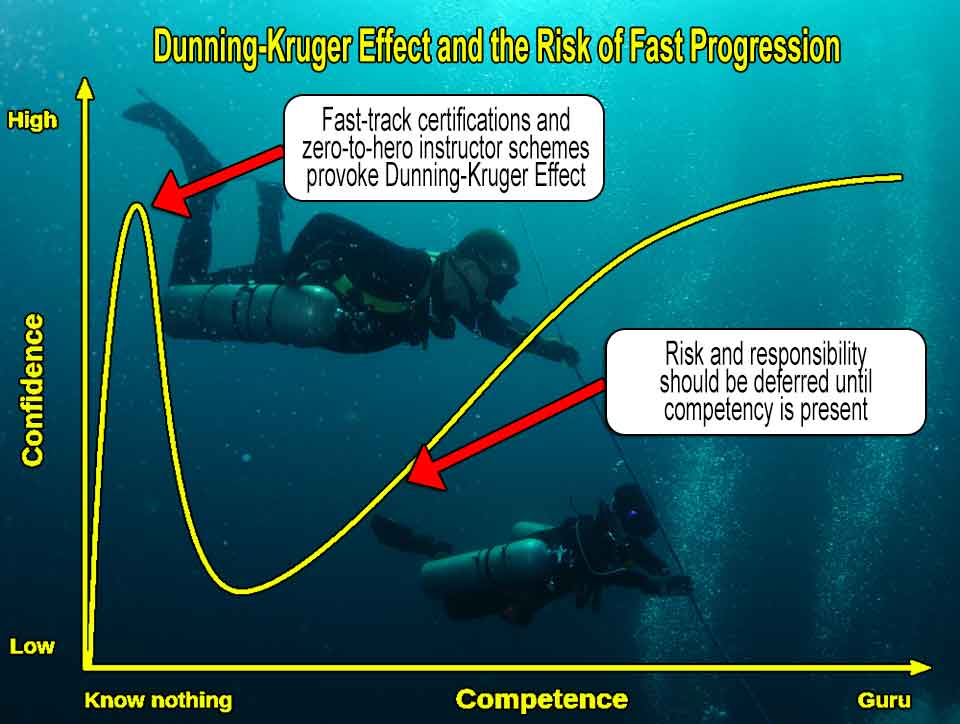
How To Deal With Divers Exhibiting The Dunning-Kruger Effect
It’s crucial to approach these observations with empathy and tact. Directly confronting someone exhibiting the Dunning-Kruger effect can be met with resistance.
Encouraging a growth mindset, open dialogue, and a willingness to learn can help individuals affected by this bias recognize and overcome it, facilitating personal and professional growth.
Keep Your Eyes (and mind!) Open For The Dunning-Kruger Effect
In conclusion, the Dunning-Kruger Effect is a psychological phenomenon that can have significant implications for risk judgment in scuba diving. Understanding how this cognitive bias may affect both novice and experienced divers is essential for promoting safety within the diving community.
As we’ve explored, overconfidence and limited self-awareness can lead to poor decision-making underwater, potentially putting lives at risk. To mitigate these effects, dive training programs and instructors should prioritize comprehensive education at a reasonable pace, slowly acquiring practical experience and ongoing mentorship.
By recognizing the Dunning-Kruger Effect and its impact on risk judgment, divers can make more informed decisions, prioritize safety, and enjoy the incredible underwater world responsibly. In the world of scuba diving, knowledge is not only power but a lifeline to explore the depths safely.
Dunning-Kruger Effect References
- Unskilled and unaware of it: how difficulties in recognizing one’s own incompetence lead to inflated self-assessments.
- Kruger J, Dunning D.J Pers Soc Psychol. 1999 Dec;77(6):1121-34. doi: 10.1037//0022-3514.77.6.1121.PMID: 10626367
- Why the Unskilled Are Unaware: Further Explorations of (Absent) Self-Insight Among the Incompetent.
- Ehrlinger J, Johnson K, Banner M, Dunning D, Kruger J.Organ Behav Hum Decis Process. 2008 Jan 1;105(1):98-121. doi: 10.1016/j.obhdp.2007.05.002.PMID: 19568317
- How chronic self-views influence (and potentially mislead) estimates of performance.
- Ehrlinger J, Dunning D.J Pers Soc Psychol. 2003 Jan;84(1):5-17.PMID: 12518967
- Unskilled and unaware–but why? A reply to Krueger and Mueller (2002).Kruger J, Dunning D.J Pers Soc Psychol. 2002 Feb;82(2):189-92.PMID: 11831409
- Skilled or unskilled, but still unaware of it: how perceptions of difficulty drive miscalibration in relative comparisons.Burson KA, Larrick RP, Klayman J.J Pers Soc Psychol. 2006 Jan;90(1):60-77. doi: 10.1037/0022-3514.90.1.60.PMID: 16448310
- How chronic self-views influence (and mislead) self-assessments of task performance: self-views shape bottom-up experiences with the task.Critcher CR, Dunning D.J Pers Soc Psychol. 2009 Dec;97(6):931-45. doi: 10.1037/a0017452.PMID: 19968411
- Skill and self-knowledge: empirical refutation of the dual-burden account of the Dunning-Kruger effect.McIntosh RD, Moore AB, Liu Y, Della Sala S.R Soc Open Sci. 2022 Dec 7;9(12):191727. doi: 10.1098/rsos.191727. eCollection 2022 Dec.PMID: 36483762 Free PMC article.
- A Statistical Explanation of the Dunning-Kruger Effect.Magnus JR, Peresetsky AA.Front Psychol. 2022 Mar 25;13:840180. doi: 10.3389/fpsyg.2022.840180. eCollection 2022.PMID: 35401341
- Dunning-Kruger effects in reasoning: Theoretical implications of the failure to recognize incompetence.Pennycook G, Ross RM, Koehler DJ, Fugelsang JA.Psychon Bull Rev. 2017 Dec;24(6):1774-1784. doi: 10.3758/s13423-017-1242-7.PMID: 28224482
- The Dunning-Kruger Effect Helps Explain Why People Resist Hearing Constructive Criticism. Mark Murphy. Forbes
If you found this article informative, consider these:
About The Author

Andy Davis is a RAID, PADI TecRec, ANDI, BSAC, and SSI-qualified independent technical diving instructor who specializes in teaching sidemount, trimix, and advanced wreck diving courses.
Currently residing in Subic Bay, Philippines; he has amassed more than 10,000 open-circuit and CCR dives over three decades of challenging diving across the globe.
Andy has published numerous diving magazine articles and designed advanced certification courses for several dive training agencies, He regularly tests and reviews new dive gear for scuba equipment manufacturers. Andy is currently writing a series of advanced diving books and creating a range of tech diving clothing and accessories.
Prior to becoming a professional technical diving educator in 2006, Andy was a commissioned officer in the Royal Air Force and has served in Iraq, Afghanistan, Belize, and Cyprus.
In 2023, Andy was named in the “Who’s Who of Sidemount” list by GUE InDepth Magazine.
Purchase my exclusive diving ebooks!
Originally posted 2023-09-19 18:38:30.

